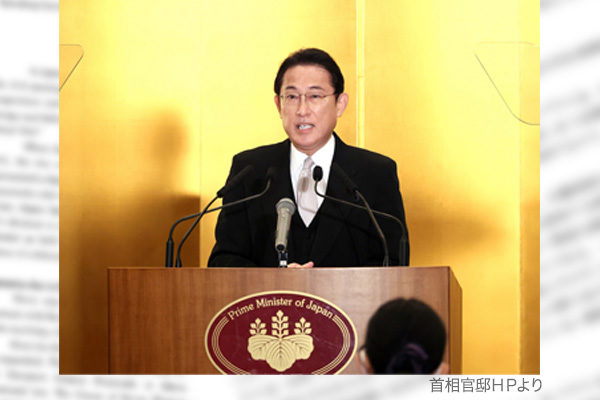Japan in 2022 is in the midst of crises. In the drastically changing world, the prime minister of Japan has a historic mission. His responsibility is to contribute to creating a better Japan and a better world by utilizing wisdom, technologies, economic power, military strength and courage of more than 120 million serious Japanese people. Prime Minister Fumio Kishida’s faith and ability to get things done will be tested this year.
Lacked powerfulness in the first 100 days
In his first 100 days as prime minister that end on January 11, Kishida’s remarks and decisions have not been powerful enough to contribute to Japan and the world. Rather, he seems careful of not making waves in handling the government before the triennial House of Councilors election planned for July 10. For instance, he has a tendency of delaying decisions that could provoke Beijing or come under fire from the Asahi Shimbun newspaper and other liberal media.
In a typical case, he killed a proposed National Diet resolution to blame Beijing for cracking down on Uyghurs. The proposed resolution ostensibly failed in the face of opposition from the ruling Liberal Democratic Party’s junior coalition partner Komeito. This was not the case. The draft resolution had not called China by name. Komeito’s additional request to drop the word “blame” from the draft was accepted by the LDP. The final draft thus became almost meaningless. Even so, the parliament was planned to adopt the final draft to demonstrate Japan’s stance to the world. On December 15, however, the plan was abruptly rejected. Multiple government and LDP sources said the prime minister made the final decision.
Japan’s announcement of a diplomatic boycott of the Beijing Winter Olympic Games also lagged far behind that in Western countries due to Kishida’s policy of not provoking Beijing.
Aa for beefing up the Self-Defense Forces to deal with Chinese threats, Kishida has already promised to increase defense spending to more than 2% of its gross domestic product. He proactively increased defense spending under the FY 2021 supplementary budget. In a budget proposal for 2022, however, defense spending remains almost unchanged from the previous year. A Japan-U.S. joint statement on the occasion of a recent online meeting between Japanese and U.S. foreign and defense ministers noted that “Japan expressed its resolve to examine all options necessary for national defense including capabilities to counter missile threats,” leading to the interpretation that the capabilities to attack enemy bases were kept in mind. But the Kishida administration has not declared any plan to have such capabilities yet.
Determination required to deter China
Kishida may want to tide over the July election and achieve the longevity of his administration by shelving issues that could cause frictions, albeit important ones related to national interests. This idea would be wrong in the midst of crises.
If Japan fails to proactively work with the United States in contributing to Indo-Pacific peace and stability in the drastically changing international situation, the significance of the Japan-U.S. alliance will be doubted. Peace and stability will be achieved not by the policy of refraining from provoking China, but by the strong will and strength to deter brutal Chinese actions. The Japanese people will support an administration that realizes such strategy.
Yoshiko Sakurai is a freelance journalist and President, Japan Institute for National Fundamentals.


